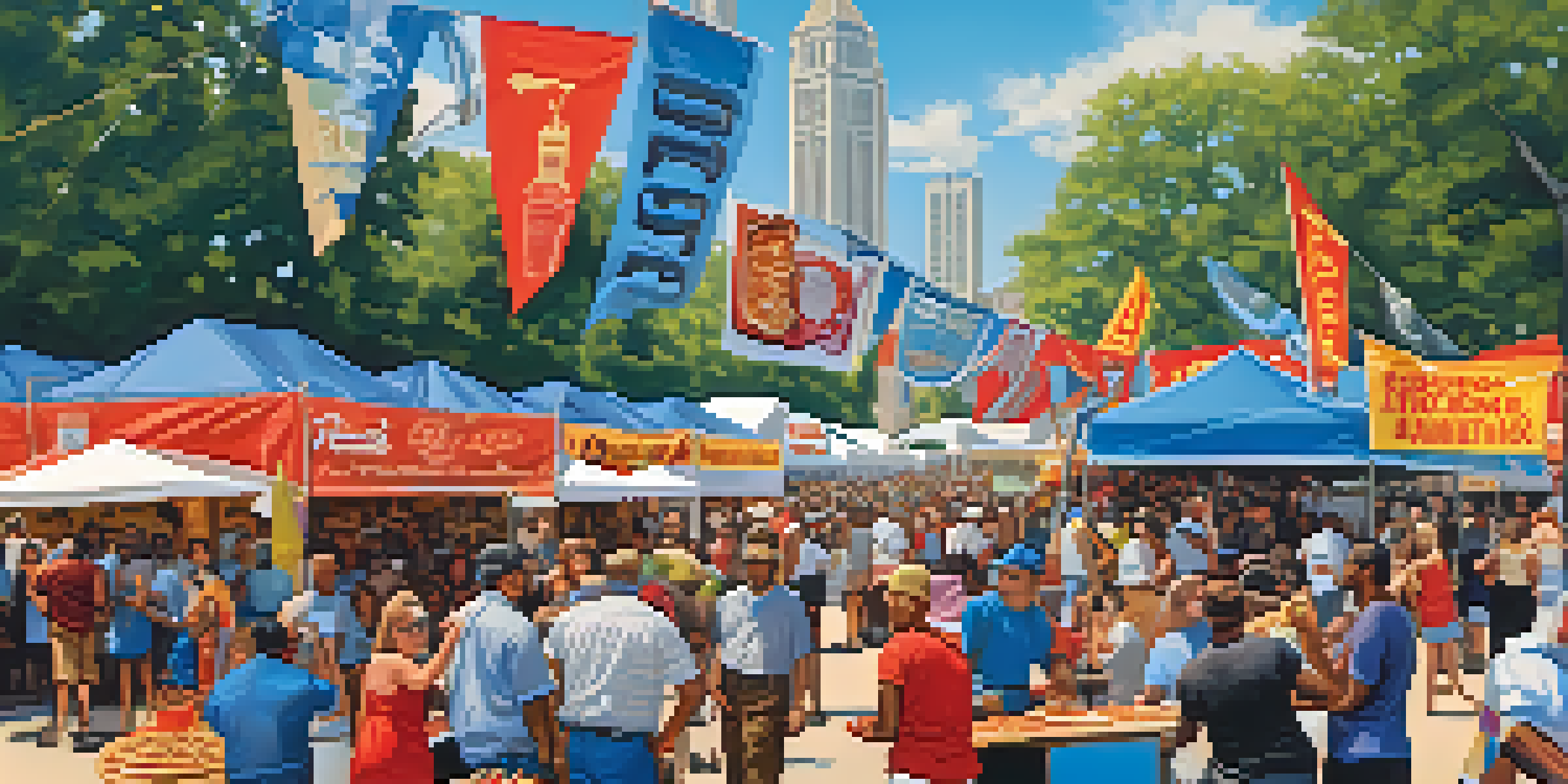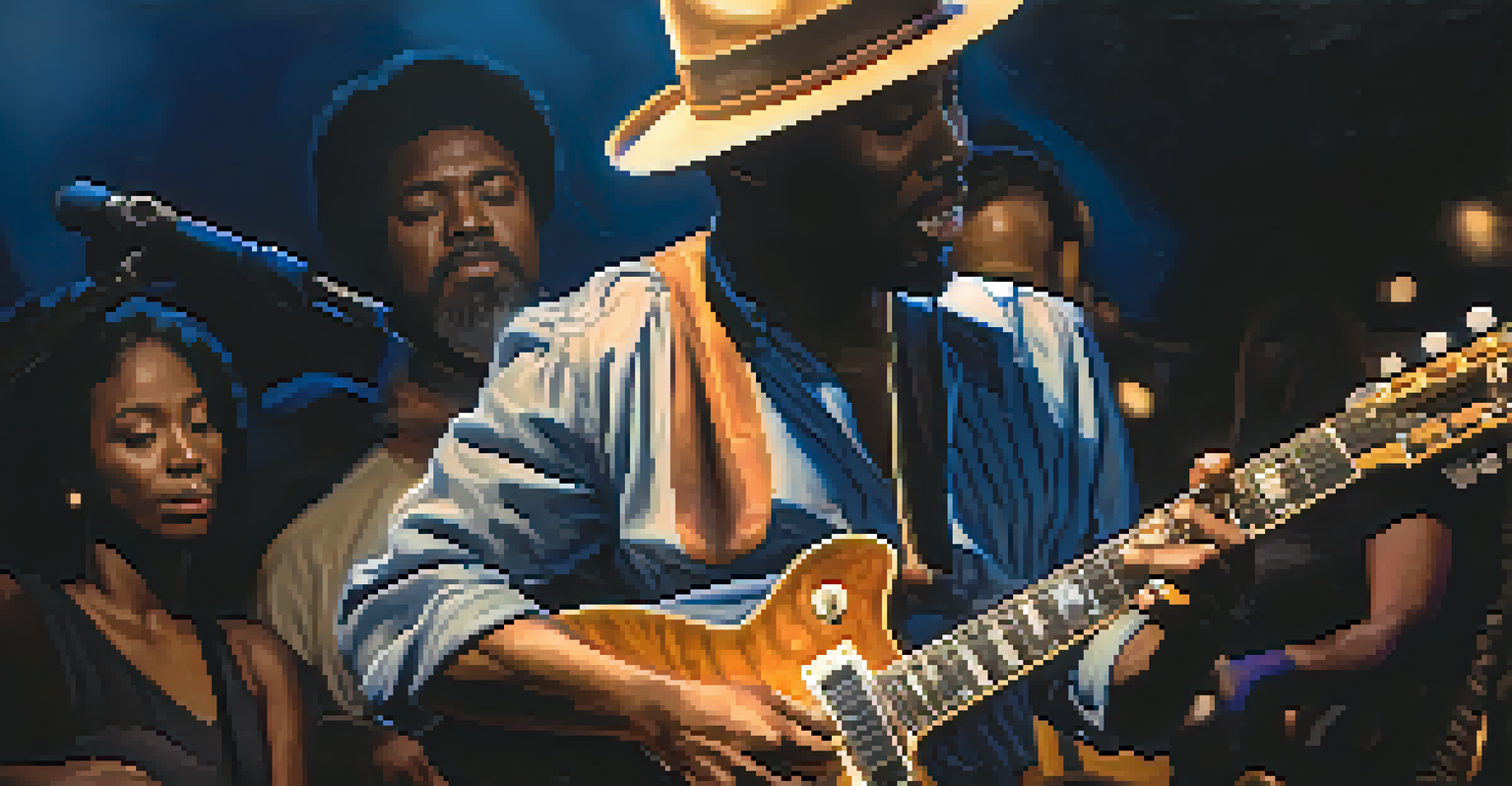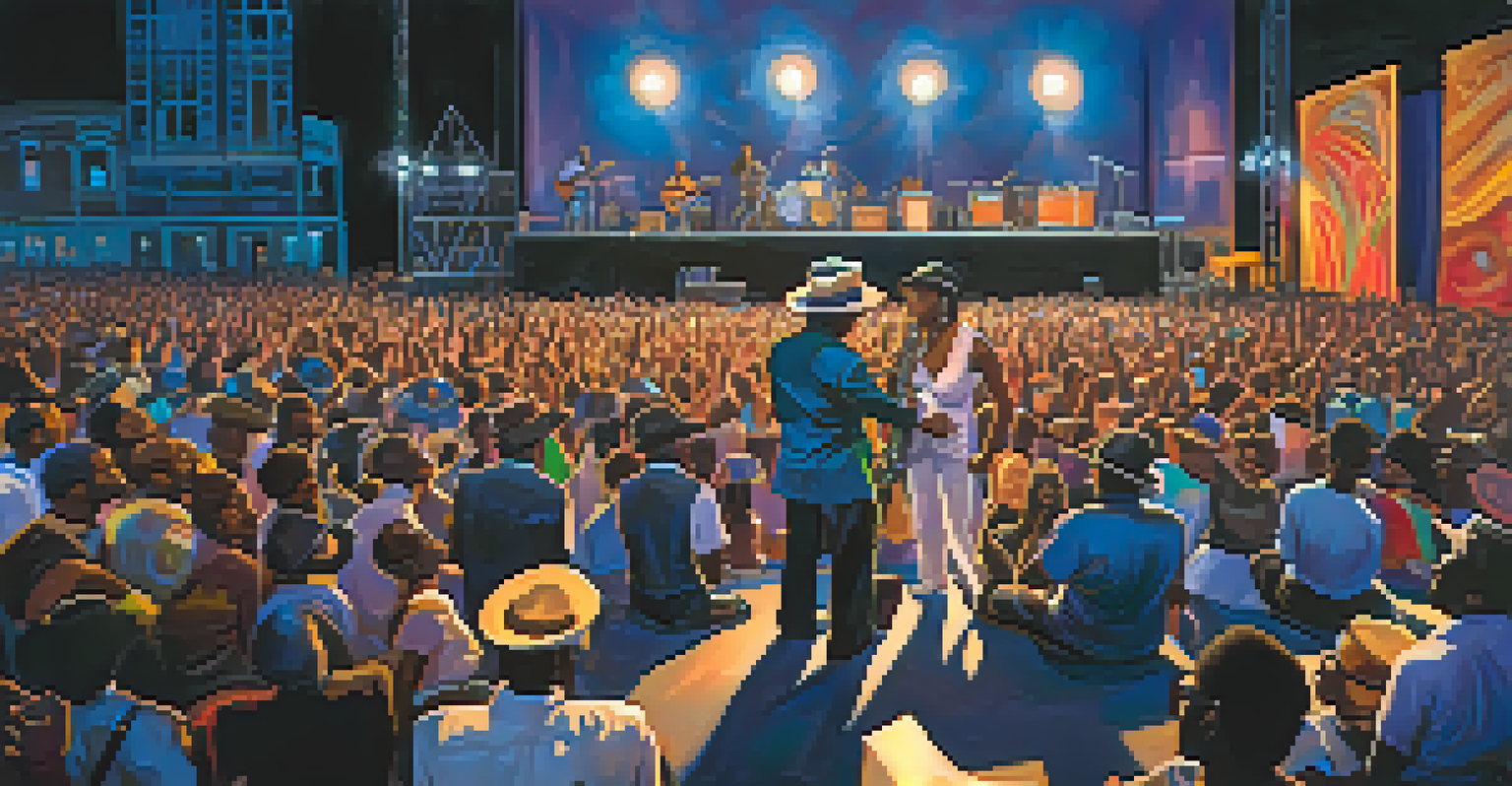Exploring the Chicago Blues Festival and Its Artistic Impact

A Brief History of the Chicago Blues Festival
The Chicago Blues Festival has its roots deeply embedded in the city’s vibrant music scene, which began to flourish in the 1920s. This festival, first held in 1984, was initiated to celebrate the rich heritage of blues music that the city is renowned for. Over the years, it has grown into one of the largest free blues festivals in the world, attracting thousands of visitors each year.
The blues is the roots; the rest is the fruits.
Chicago's blues scene has been a melting pot of various musical influences, from African American spirituals to jazz and rock. These sounds have come together to create a unique genre that resonates with audiences both locally and globally. The festival not only honors legendary artists but also serves as a platform for emerging talent to shine.
Throughout its history, the festival has featured iconic performers like Muddy Waters, Buddy Guy, and Koko Taylor, who have left an indelible mark on the music world. Each year, attendees experience a rich tapestry of performances that showcase the evolution of blues music, reflecting its ongoing relevance and appeal.
Cultural Significance of the Blues Genre
Blues music is more than just a genre; it's a cultural expression that tells the stories of hardship, resilience, and hope. Originating from African American communities, the blues captures the essence of life's struggles and triumphs. This emotional depth is what makes the music relatable, transcending racial and geographical boundaries.

The genre has influenced countless musicians across various styles, including rock, jazz, and hip-hop. For instance, artists like Eric Clapton and The Rolling Stones have credited blues legends as primary inspirations for their own music. The festival serves as a reminder of this legacy, showcasing the interconnectedness of musical styles and the blues' lasting impact.
Chicago Blues Festival Heritage
The festival celebrates the rich heritage of blues music that has shaped Chicago's vibrant music scene since the 1920s.
As the festival celebrates this rich history, it fosters a sense of community and belonging. Attendees from all walks of life come together to enjoy the music, creating shared experiences that transcend cultural differences. This unity speaks to the power of blues as a universal language of emotions.
The Festival Experience: What to Expect
Attending the Chicago Blues Festival is like stepping into a musical time capsule, where the atmosphere is charged with energy and enthusiasm. Held in Grant Park, the festival features multiple stages, each showcasing a diverse lineup of artists. From soulful ballads to upbeat rhythms, there's something for everyone to enjoy.
Blues is a tonic for whatever ails you.
In addition to the music, festival-goers can indulge in local food vendors, offering classic Chicago cuisine that enhances the overall experience. Tasty treats like deep-dish pizza and Chicago-style hot dogs are just a few of the culinary delights available. This combination of food and music creates a lively festival atmosphere that keeps attendees coming back year after year.
Moreover, the festival often includes workshops and discussions where aspiring musicians can learn from seasoned artists. These sessions provide invaluable insights into songwriting, performance techniques, and the history of blues music. For many, this opportunity to engage with the music and its creators is a highlight of the festival.
Spotlighting Emerging Artists at the Festival
One of the most exciting aspects of the Chicago Blues Festival is its commitment to showcasing emerging artists. Each year, the festival provides a platform for up-and-coming musicians to perform alongside established legends. This not only gives new talent exposure but also keeps the blues genre fresh and evolving.
These emerging artists often bring their unique perspectives and styles to the stage, infusing traditional blues with contemporary influences. This blending of old and new helps to keep the genre relevant in today's rapidly changing music landscape. Audiences often discover their new favorite artists at the festival, creating a sense of connection and excitement.
Showcasing Emerging Talent
Each year, the festival highlights emerging artists, blending traditional blues with contemporary influences to keep the genre evolving.
By highlighting these rising stars, the festival plays a crucial role in the future of blues music. It encourages young musicians to pursue their passion and helps to ensure that the legacy of blues continues for generations to come. This nurturing of talent is vital for the sustainability of the genre and the industry as a whole.
The Economic Impact of the Festival
Beyond its cultural significance, the Chicago Blues Festival also has a notable economic impact on the city. As one of the largest free music festivals, it attracts thousands of visitors, which boosts local businesses. Hotels, restaurants, and shops all benefit from the influx of tourists who come to enjoy the music and the city’s vibrant culture.
The festival generates revenue not only through tourism but also by creating job opportunities for local vendors and artisans. From food stalls to merchandise booths, the event supports small businesses and fosters entrepreneurship within the community. This economic stimulation helps to sustain local culture and arts.
Moreover, the festival raises awareness of the Chicago blues scene, drawing attention to the city as a music destination. As people experience the festival, many return for future visits, further contributing to the local economy. This cycle of tourism and cultural appreciation is essential for the ongoing growth of the city.
Community Engagement and Outreach Programs
The Chicago Blues Festival is committed not only to celebrating music but also to giving back to the community. Through various outreach programs, the festival seeks to engage local residents and promote music education. These initiatives aim to inspire the next generation of musicians and foster a deeper appreciation for the blues genre.
Programs often include school workshops, where students can learn about the history and significance of blues music. These experiences provide young people with insights into the cultural roots of the genre and encourage them to explore their musical talents. By making music accessible, the festival helps cultivate a new wave of artists.
Economic and Community Impact
The festival not only boosts the local economy by attracting tourists but also engages the community through music education and outreach programs.
Additionally, the festival partners with local organizations to support community development projects. These collaborations enhance the festival's impact, ensuring that the celebration of blues music extends beyond the event itself. This commitment to community engagement reflects the festival's values and underscores its importance in the cultural landscape.
Looking Ahead: The Future of the Chicago Blues Festival
As the Chicago Blues Festival continues to thrive, its future is filled with exciting possibilities. The festival's leadership is always looking for ways to innovate and enhance the experience for attendees. This includes incorporating new technologies, promoting diversity, and expanding the range of performances.
In an ever-changing musical landscape, the festival aims to remain relevant by embracing new genres and styles that have been influenced by blues. By doing so, it can attract a wider audience and ensure that blues music continues to resonate with future generations. This adaptability is crucial for the festival’s longevity.

Moreover, as the blues genre evolves, so too does the festival's role in preserving its rich history. By documenting performances and artist stories, the festival can create a valuable archive that honors the past while inspiring the future. This commitment to both tradition and innovation ensures that the Chicago Blues Festival remains a cornerstone of the city’s cultural identity.